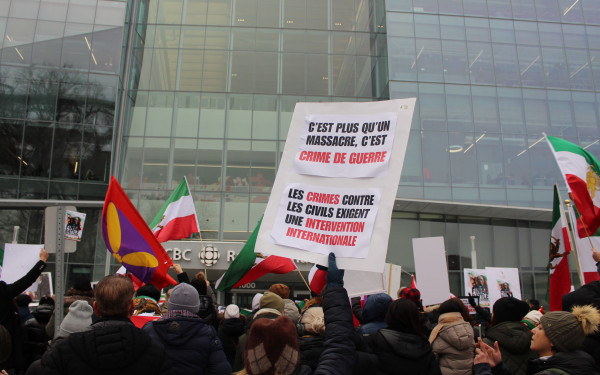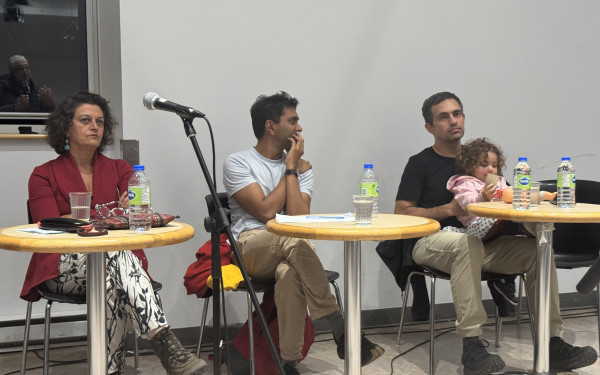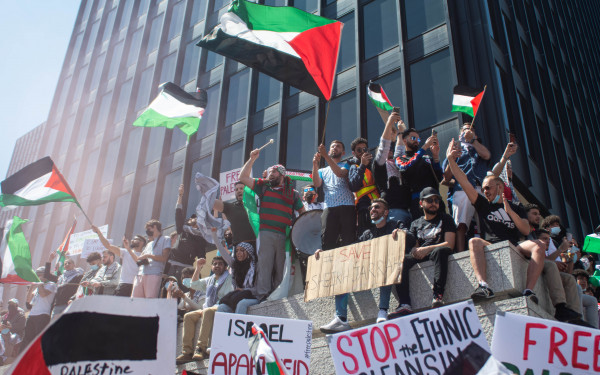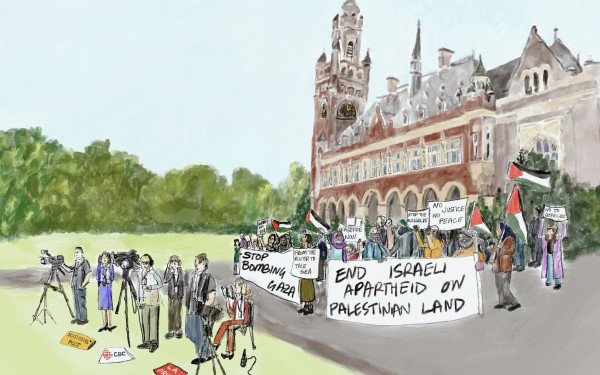Intercepted is a harrowing look at the Russian invasion of Ukraine
Oksana Karpovych reveals the destruction of war through intercepted Russian phone calls and silent imagery
Intercepted opens in an idyllic setting: Children are playing outdoors, chalk drawings decorate the sidewalk, a toy stroller sits idly nearby and a child swings gently back and forth.
Within seconds, the calm is pierced by an ominous soundscape, transitioning viewers from this tranquil moment to a new scene of a vehicle driving through war-torn Ukraine.
Intercepted is directed by Ukrainian filmmaker Oksana Karpovych. The film made its Quebec premiere at Cinéma Cineplex Odeon Quartier Latin on Nov. 25. It was shown at the Rencontres internationales du documentaire de Montréal, Montreal’s international documentary festival.
The documentary uses footage of a devastated Ukraine, overlayed with intercepted phone audio from Russians on the battlefield to their families back home, recorded by Ukrainian special services. These conversations capture the attitude of Russian soldiers on the war, describing their worries, ambitions and actions of the day.
The phone calls follow the Russian Armed Forces’ invasion of Ukraine starting in 2022. Though the Russo-Ukrainian war had been going on since 2014, on Feb. 24, 2022, Russia invaded Ukraine, intensifying the war. According to the UN Human Rights Monitoring Mission in Ukraine, there have been 11,743 civilian deaths as of Aug. 31, 2024.
In one call, a Russian mother warns her son not to be the first to head into combat.
“It doesn’t matter if I'll be first or second,” he replies. “We will go there and be killed.”
Filming in Ukraine came with significant obstacles.
“The direct physical risk for our lives, but also, of course, the mental stress,” Karpovych told The Link. “You have to scan locations all the time for the potential danger.”
One of the standout qualities of this film is its ability to convey a message through imagery alone. Heart-breaking loss is tragically expressed through the lens of the camera.
The imagery is striking: deserted kitchens, dishes left in the sink, food abandoned to flies and potted plants wilting beside shattered windows. Homes that were once bustling with life now sit in stillness. In one scene, the only movement is that of a moth fluttering past or wind rustling white lace curtains—an eerie illumination of time frozen and life lost in Ukraine.
Karpovych expressed how she wanted to bring the audience into a state of cognitive dissonance.
“That's how I describe a state that I found myself in,” Karpovych said. “There is a drastic difference between the reality I was living, surviving and the reality of the war, and what I was hearing in the intercepted phone calls.”
In one such call, a soldier confesses to his mother, “I’m telling you, we kill people here, Mom.”
“Well, are you sure these are people?” she responds.
During the post-screening Q&A, Karpovych discussed how the phone recordings give insight not only into Russians on the front lines but also into Russian society.
“In a way, I think the main characters of this film are not the soldiers, but rather their families, sisters, wives, girlfriends, back in Russia to whom they call,” Karpovych said. “Unfortunately, the insight they give us is pretty tragic […]. These are the people who are disconnected from reality, from themselves, from their hearts, from their minds. They are deeply manipulated.”
Russia is a nation deeply influenced by state-run propaganda, which limits the world's knowledge on the authentic feelings of Russian people. Karpovych’s use of intercepted phone calls breaks through this barrier, revealing a more unfiltered perspective from the Russian side. This approach highlights her skill as a filmmaker in connecting the world with voices that are otherwise blocked.
The film’s silent scenes hang in the air, creating an uncomfortable tension. There are shots of men smoking quietly and alone. In some scenes, background noise makes the only sound, such as the steady sound of a woman opening tin cans as she prepares a meal. In an underground shelter, another woman eats alone beneath the harsh glare of fluorescent light. The space is quiet, broken only by the muffled hum of a radio playing faint music.
“The people who were there evacuated, or were killed.” Karpovych said, describing the reason behind the silence that suffocates the air in buildings and towns. “Silence also means suspense […] we are constantly waiting for bad news, for new attacks, for the unknown.”
Karpovych’s attention to the sensory experience enhances the quality of the film. The viewer is transported to Ukraine and forced to confront the totalizing atmosphere of war.
Contrasting images show life persisting amidst destruction: a man carries a baby past a charred building, while others lounge on a beach with a collapsed building in the background. These juxtapositions, paired with Russian recordings justifying the violence, force viewers to question the war’s logic.
Karpovych expressed she doesn’t want the audience to be emotional or under a state of shock when watching the documentary.
“I wanted them to rather think about the reasons for this war,” Karpovych said. “Not just this war, but more universally. The reasons, if there are any, for such brutal human violence.”
The documentary stands as provocative filmmaking, challenging viewers to reconsider the complex and twisted factors that justify human violence.
Despite the devastation of collapsed infrastructure, the resilience of the Ukrainian people remains unbroken. The documentary shows Ukrainians coming together, sharing family meals, cleaning their homes after attacks and supporting one another. In a show of solidarity, citizens distribute aid at a church, greet each other on the streets and share smiles, all while striving to maintain a form of normality in the face of hardship.
“What impresses me in my people […] is their ability to unite,” Karpovych said. “It's the maintenance of normality, that there is a form of resistance.”
The film began with the Russians’ invasion of Ukraine. The army was optimistic and confident. Yet, as the film follows their journey, the audience witnesses the death of the Russians’ spirit—the invasion was far more difficult than the soldiers had originally expected. The death toll was increasing, and the army was facing disillusionment and despair.
“Not only physical death but, more importantly, spiritual death,” Karpovych explained how the Russian soldiers “lost their humanity.”
Intercepted is a devastating, but necessary depiction of the mental and physical toll facing both sides of the Russo-Ukrainian war. The film’s journey humanizes a war that betrays humanity, capturing human life amidst destruction.
The film’s final scene unfolds in darkness, illuminated only by the headlights of a car, as we hear a distraught soldier speak.
“I have a machine gun. They will not take me, by any means, by any means,” he says. The call is frantic and emotional.
“You are a hero, can you hear me?” a woman cries on the other end. “You are a hero to me, my most personal hero!”
As the documentary came to an end, Karpovych came to the front of the theatre and requested a moment of silence.
“In the memory of everyone we lost in Ukraine,” she said.
Intercepted will be in Montreal theatres Jan. 31.







